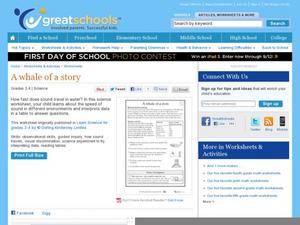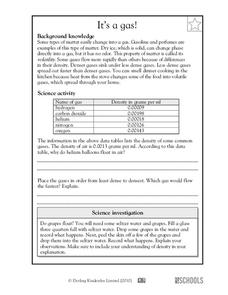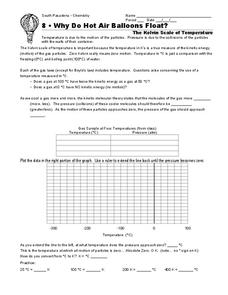Edmond Public Schools
8th Grade Science Resource Book: Unit 2 - Physics
Get things moving with this extensive collection of physical science resources. Covering the fundamentals of measurement, graphing, lab safety, and experimental design as well as the specific scientific concepts...
Curated OER
Fourth Grade Science
In this science worksheet, 4th graders complete multiple choice questions about electricity, the sun, sound, and more. Students complete 25 questions.
Curated OER
Balloon Rockets
In this balloon rocket worksheet, students experiment with a balloon, clothespin, straw, string and tape to observe Newton's Third Law of Motion in action. Students explain the action force and reaction force acting in the investigation.
Curated OER
Physical Science Review 5th Grade
In this review of physical science worksheet, students use recall to answer multiple choice questions about electricity and chemical changes. Students answer 25 questions.
Curated OER
4th Grade Science
In this physical science learning exercise, 4th graders complete multiple choice questions about force, simple machines, communication and more. Students complete 25 questions.
Curated OER
Nature of Science and Measurement Review
For this nature of science and measurement worksheet, students answer 30 questions about experimental design, pure science vs. applied science, density, metric conversions and dimensional analysis.
Curated OER
2008 U.S. National Chemistry Olympiad Part III
In this chemistry olympiad lab worksheet, chemists are required to design two experiments. In one, they design an experiment to identify seven solutions given to them in pipettes. In the other, they design an experiment to determine the...
Curated OER
Weighing air
In this weighing air worksheet, students complete an experiment where they use balloons, string, a balance, a stick, and more in order to weigh air. Students also answer 7 questions.
Curated OER
Temperature and the Density of Air
Here is a hands-on activity in which junior scientists put air into a balloon to create a closed system. They measure its circumference, warm it in hot water, and then remeasure its circumference to discover how temperature affects the...
Curated OER
Following Directions
Kindergartners learn about the ways force can stop and reverse motion. Several illustrations of children help them determine if the motion is causing an item to change direction. Next, they conduct an experiment to see if a water balloon...
Adrian College
The Universe
Young scientists create a simulation of Hubble's law. Introducing the Big Bang Theory using balloons and a simple lab learning exercise, scholars complete a data table and perform analysis.
Curated OER
A Whale of a Story
Does sound travel faster in water or in the air? Put the question to the test with a science experiment. After reviewing a table of data, third and fourth graders decide which statements are true and which ones are false. The bottom of...
Curated OER
It's A Gas!
Fifth graders complete a worksheet which has them place a list of gases in order from the least to the most dense. The density in grams is given for each. There's a good paragraph which provides background knowledge about the volatility...
Weebly
Definitions of Conduction, Convection, and Radiation
There's quite a bit in this physical science packet. First, how is heat transferred? Learners read a brief explanation of conduction, convection, and radiation before identifying common occurrences (with pictures) as one of the three....
Curated OER
Science Quiz B-Grade 5
In this grade 5 science quiz worksheet, 5th graders complete a 15 question multiple choice quiz covering a variety of grade 5 concepts.
Texas State Energy Conservation Office
Investigation: Conservation of Energy
By rolling marbles down a six-foot length of track, physical scientists determine how much energy is lost to heat. It is recommended that you opt for the foam pipe insulation track because more friction slows the marble, allowing...
Curated OER
Why Do Hot Air Balloons Float?
In this gases worksheet, students read about the Kelvin scale of temperature, they answer 3 fill in the blank questions about the relationship between temperature and pressure and they plot the temperature and pressure of gas samples at...
Curated OER
Why Do Hot Air Balloons Float?
In this Boyle's Law worksheet, students solve eight problems using the inverse relationship between the volume of a gas and the pressure of a gas at a constant temperature.
Curated OER
Why Do Hot Air Balloons Float?
For this Charles' Law worksheet, students solve 8 gas law problems where the pressure is constant and the volume varies directly with the temperature.
Michigan State University
Gases Matter
Young scientists learn that seeing isn't necessarily believing when it comes to the states of matter. After performing a fun class demonstration that models the difference between solids, liquids, and gases, children complete a series of...
Curated OER
What In The World Are Swim Bladders and Why Are They Important
In this swim bladders worksheet, students use a bowl, water, and balloons to make swim bladders, and answer short answer questions about them. Students answer 7 questions and interview someone who has been scuba diving.
Curated OER
Static Electricity
In this static electricity worksheet, pupils use balloons, flannel cloths, and a plastic bag to create static electricity. Students then fill out 3 tables and answer 3 short answer questions.
Curated OER
The Expanding Universe
In this expanding universe learning exercise, students create a universe with balloons, clothes pins, markers, and more and see what this means for the distance between the Earth and stars. Students follow 6 directions and answer 3...
Curated OER
The Magic Of Static Science Station Experiment
In this magic of static electricity set of station activities worksheets, students perform 4 activities with static electricity including popping corn, jumping peanuts, weird water, and dancing balloons. They complete the recording...























